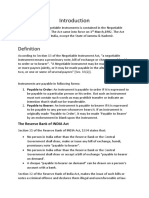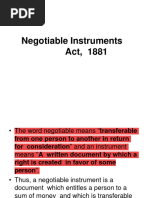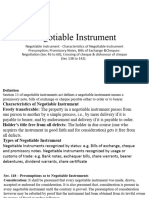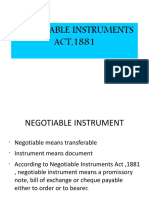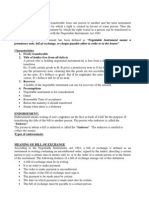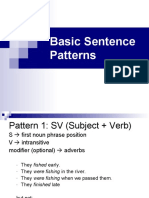0 ratings0% found this document useful (0 votes)
38 viewsMost Common Forms of Negotiable Instrument
1. Promissory notes, bills of exchange, checks, and other negotiable instruments are the most common forms of negotiable instruments.
2. A promissory note is an unconditional written promise to pay a sum certain in money to the order or bearer of the note. It must include the amount due, place, date, date of maturity, signature of the maker, and may include other details.
3. A bill of exchange is an unconditional written order from one person to another to pay a sum certain in money to the order or bearer of the bill. It must include the order to pay, signature of the drawer, name of the drawee, and may include other details. Checks
Uploaded by
Jeanne CalalinCopyright
© © All Rights Reserved
Available Formats
Download as DOCX, PDF, TXT or read online on Scribd
0 ratings0% found this document useful (0 votes)
38 viewsMost Common Forms of Negotiable Instrument
1. Promissory notes, bills of exchange, checks, and other negotiable instruments are the most common forms of negotiable instruments.
2. A promissory note is an unconditional written promise to pay a sum certain in money to the order or bearer of the note. It must include the amount due, place, date, date of maturity, signature of the maker, and may include other details.
3. A bill of exchange is an unconditional written order from one person to another to pay a sum certain in money to the order or bearer of the bill. It must include the order to pay, signature of the drawer, name of the drawee, and may include other details. Checks
Uploaded by
Jeanne CalalinCopyright
© © All Rights Reserved
Available Formats
Download as DOCX, PDF, TXT or read online on Scribd
You are on page 1/ 4
Most Common Forms of Negotiable Instrument o Indicate the amount of the note
and is more quickly grasped
1. Promissory Notes
that if the written in words
2. Bill of Exchange
2. Place
3. Checks, which are also bills of exchange
o Where the contract to pay is
but of a special kind
executed
4. Other forms of negotiable instruments
3. Date
If the instrument does not comply with the o Determine when the note is
requirements of Negotiable Instruments Law due or to fix the time when the
interest is to run
- Simple contract in writing and merely
o When the payment of interest
an evidence of intangible rights which
is stipulated
may have been created by the assent of
o Whether or not the collection
the parties
of instrument is barred by the
If the instrument complies with the statute of limitations
requirements of Negotiable Instruments Law 4. Date of maturity
o Time when the promise to pay
- Instrument in itself is a contract and not
is to be fulfilled
a mere evidence of rights
o If date of maturity is not stated,
- It is a mercantile specialty
the instrument is payable on
Promissory Note demand
5. Promise
A negotiable promissory note, within the
o Absolute promise to do
meaning of this act, is an unconditional promise
something, that is to pay
in writing made by one person to another,
o Not subject to the fulfillment of
signed by the maker, engaging to pay on
a condition
demand or at a fixed determinable future time,
6. The words “to the other of”
a sum certain in money to order or bearer.
o Promise to pay as ordered or as
When a note is drawn to the maker’s own
commanded by the payee
order, it is not completed until indorsed by him.
o Instrument may be payable to
Promissory note bearer
7. Name of the payee
- A promise to pay a sum certain in
o Payee
money
o Person whose order or
- On demand or at a fixed determinable
command the money is
future time
promised to be paid
- Must be distinguished from the use of
8. Signature of the maker
cash
o Maker of the nore
General Characteristics of a Promissory Note o One who promises to pay it at
the first instance
1. Figures at the upper left hand corner of
o May be signed by more than
the instrument
one person, either
jointly/severally
o
9. Place of payment whether a commercial paper is a bill of
o Where the note is to be paid exchange or not
o Instrument may be made
General Characteristics of a Bill of Exchange
payable at any other place
agreed upon by the parties 1. Order or command to pay (“Pay to”)
10. Amount which shall be written in words 2. Signature of the drawer
o Sum promised to be paid o Drawer
written in words o Corresponds to maker of a
o It cannot be easily altered since promissory note
it takes longer to write the 3. Name of the drawee
words than the figures o Drawee
o Words are more likely to be o The one ordered or
accurate commanded to pay a sum
11. The consideration, “for value I received” certain in money
o Indicates that a consideration
Bill of Exchange vs. Promissory Note
was given for the note
o Consideration may be specified Bill of Exchange Promissory Note
o Words “for value I received” Order or command Promise
may be omitted and the May be payable to May be payable to
consideration not specified, as order (order to pay order (promise to
consideration is presumed to order) or payable pay to order) or
to bearer (order to payable to bearer
Bill of Exchange pay to bearer) (promise to pay to
pay to bearer)
A bill of exchange is an unconditional order of
writing addressed by one person to another
signed by the person giving it, requiring the Check
person to whom it is addressed to pay demand
A check is a bill of exchange drawn on a bank
or at a fixed or determinable future time of a
payable on demand.
sum certain in money to order or to bearer.
- Special kind of bill of exchange
Bill of exchange
General Characteristics of a Check
- An order or a command in writing
addressed to someone requiring him to 1. Order or command to pay (“Pay to”)
pay a sum certain in money 2. Signature of the drawer
- Nature of acceptance does not o Drawer
determine whether negotiable paper is o Corresponds to maker of a
bill or not promissory note
- As long as a commercial paper 3. Name of the drawee
conforms with the definition of a bill of o Drawee
exchange, the paper is considered a bill o The one ordered or
of exchange commanded to pay a sum
- Nature of acceptance is important only certain in money
in the determination of the kind of
liabilities not in the determination
Check vs. Bill of Exchange o When the instrument is payable
to a person named in the
Check Ordinary Bill
instrument and no other
Always drawn upon a May or may not be
o Not negotiable because it is
bank or banker drawn against a bank
Always payable on Payable on demand neither payable to bearer nor
demand or at a fixed or payable to order
determinable future Parties to a Promissory Note
time
Not necessary that a Necessary that a bill 1. Maker
check be presented be presented for o Person who executes the
for acceptance acceptance written promise to pay
Drawn on deposit Not drawn on 2. Payee or Bearer
deposit (not o If payable to order or bearer
necessary that a
o Person in whose favor the
drawer of a bill of
promissory note is made
exchange should
have funds in the payable
hands of the drawee) o If the note is made payable to
Death of the drawer Death of the drawer bearer, no payee is designated
of a check, with the of the ordinary bill of and it is payable to the person
knowledge of the exchange does not in possession thereof
banks, revokes the revoke the authority
authority of the of the banker to pay Parties to a Bill of Exchange
banker to pay 1. Drawer
Must be presented May be presented for o Person who executes the
for payment within a payment within a
written order to pay
reasonable time after reasonable time after
2. Payee or Bearer
its issue its last negotiation
o Person in whose favor a bill of
exchange is drawn payable
To whom instruments may be payable o If the note is made payable to
bearer, no payee is designated
An instrument may be made or drawn payable
and it is payable to the person
to:
in possession thereof
1. Bearer 3. Acceptor
o When it is expressed to be o Drawee who signifies his assent
payable to bearer to the order of the drawer
o When it is payable to a person o Drawee – addressee of the bill,
named therein or bearer the person who is commanded
2. Order or orders by the drawer to pay
o When it is expressed to be a sum certain money
payable to bearer o By accepting the bill, he
o When it is payable to a becomes a party thereto and
specified person or his order liable thereon
3. Specified person o Acceptance is signified by
writing across the bill the word
“accepted” with the signature 4. Persons to whom the instrument is
of the drawee negotiated by delivery – in case of
instruments payable to bearer
Parties to a Check
o Can be negotiated by mere
1. Drawer delivery without necessity of
o Person who executes the indorsement (person
written order to pay negotiating by delivery)
2. Payee or Bearer o Person to whom the instrument
o Person in whose favor a bill of payable to bearer is negotiated
exchange is drawn payable acquires certain rights as a
o If the note is made payable to holder (person to whom an
bearer, no payee is designated instrument is negotiated by
and it is payable to the person delivery)
in possession thereof 5. Holder – payee or indorser of a bill or
3. Acceptor note, who is in possession of it, or the
o Drawee who signifies his assent bearer thereof
to the order of the drawer 6. Bearer – person in possession of a bill or
o Drawee – addressee of the bill, note which is payable to bearer
the person who is commanded
or orders by the drawer to pay
a sum certain money
o Check is certified not accepted,
but certification is equivalent to
acceptance
Other Parties to Negotiated Documents
When an instrument is negotiated, other parties
are added t the instrument. Where the
negotiation is by the indorsement completed by
delivery, the parties added are the indorser and
the indorsee.
1. Indorser
o One who negotiates by the
indorsement
o When payee indorse a bill or a
note
o When indorsee further indorses
the instrument
2. Indorsee – in case of instruments
payable to order
o One to whom the instrument is
negotiated by the indorsement
3. Persons negotiation by mere delivery
You might also like
- Slide 2 Principles of Interpersonal ComNo ratings yetSlide 2 Principles of Interpersonal Com16 pages
- Promissory Note & Bill of Exchange: Presented by Syed Kashif Shah (Group Leader) Kashif AliNo ratings yetPromissory Note & Bill of Exchange: Presented by Syed Kashif Shah (Group Leader) Kashif Ali21 pages
- Characteristics of Negotiable InstrumentsNo ratings yetCharacteristics of Negotiable Instruments12 pages
- Unit - 2 Negotiable Instruments: Kantharaju N.P. Ananya Institute of Commerce and ManagementNo ratings yetUnit - 2 Negotiable Instruments: Kantharaju N.P. Ananya Institute of Commerce and Management9 pages
- Negotiable Instruments:: PRLG 701 Fall 2014No ratings yetNegotiable Instruments:: PRLG 701 Fall 201434 pages
- Unit 3 - Negotiable Intruments Act, 1881No ratings yetUnit 3 - Negotiable Intruments Act, 188158 pages
- Negotiable Instruments: Definition of Negotiable InstrumentNo ratings yetNegotiable Instruments: Definition of Negotiable Instrument17 pages
- Negotiableinstrumentslaw 151016064544 Lva1 App6892No ratings yetNegotiableinstrumentslaw 151016064544 Lva1 App689248 pages
- Negotiable Instrument: Promissory Note, Bill of Exchange, or Cheque Payable Either To Order or To The Bearer"100% (1)Negotiable Instrument: Promissory Note, Bill of Exchange, or Cheque Payable Either To Order or To The Bearer"5 pages
- A Simple Guide for Drafting of Conveyances in India : Forms of Conveyances and Instruments executed in the Indian sub-continent along with Notes and TipsFrom EverandA Simple Guide for Drafting of Conveyances in India : Forms of Conveyances and Instruments executed in the Indian sub-continent along with Notes and TipsNo ratings yet
- Revealed From A Top Realtor: The Fastest Way To Sell Properties Like Crazy In Real Estate - Even If You Are A Complete NewbieFrom EverandRevealed From A Top Realtor: The Fastest Way To Sell Properties Like Crazy In Real Estate - Even If You Are A Complete NewbieNo ratings yet
- Vicente R: Bills, Notes and Checks Negotiable Instruments Holder in Due CourseNo ratings yetVicente R: Bills, Notes and Checks Negotiable Instruments Holder in Due Course15 pages
- 10 - Baltazar vs. Lingayen Gulf Electric PowerNo ratings yet10 - Baltazar vs. Lingayen Gulf Electric Power17 pages
- Macro Determinants of Total Factor Productivity Growth of Agriculture in PakistanNo ratings yetMacro Determinants of Total Factor Productivity Growth of Agriculture in Pakistan23 pages
- 12th Grade British Literature and Composition - HohnadelNo ratings yet12th Grade British Literature and Composition - Hohnadel3 pages
- Digital Signal Processing: Filtering of Long Data SequenceNo ratings yetDigital Signal Processing: Filtering of Long Data Sequence1 page
- The Maryland General Assembly Reading ListNo ratings yetThe Maryland General Assembly Reading List15 pages
- Bp. Clarence Kelly - The Sacred and The ProfaneNo ratings yetBp. Clarence Kelly - The Sacred and The Profane329 pages



